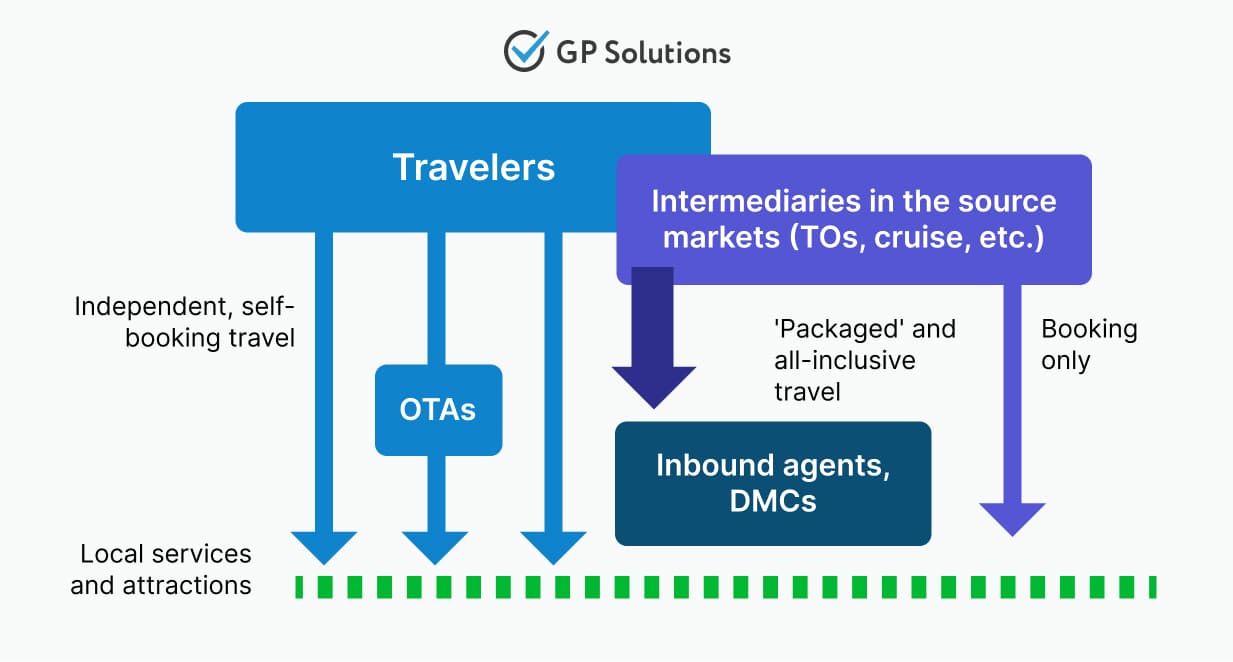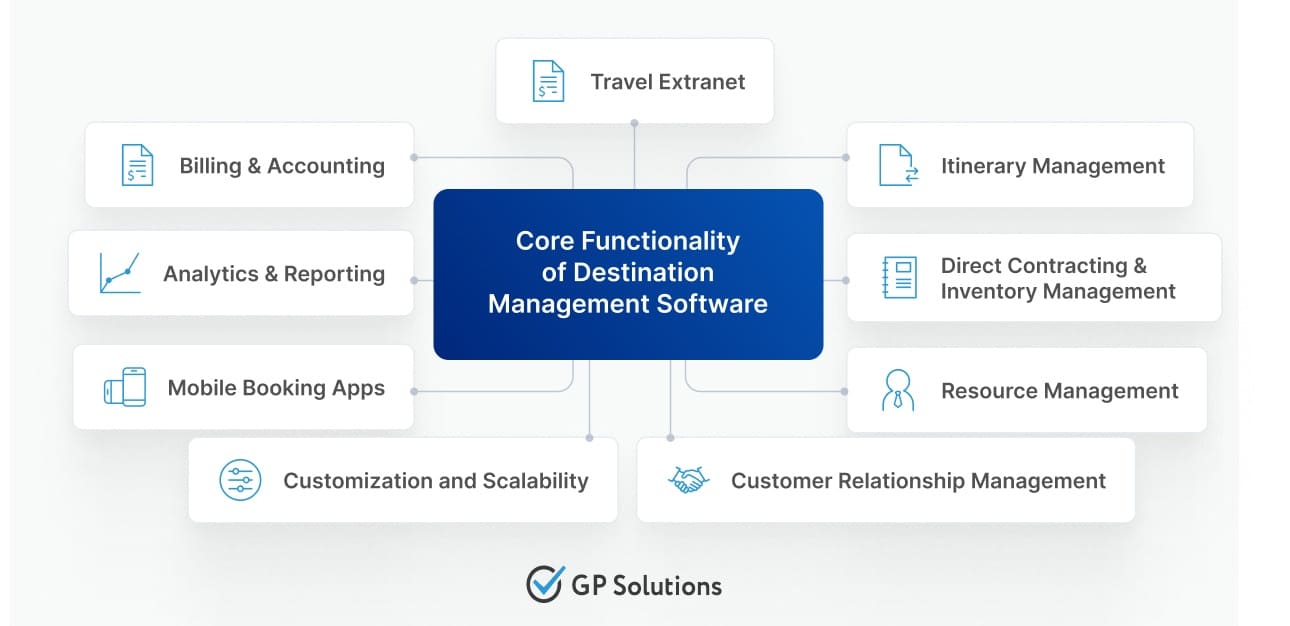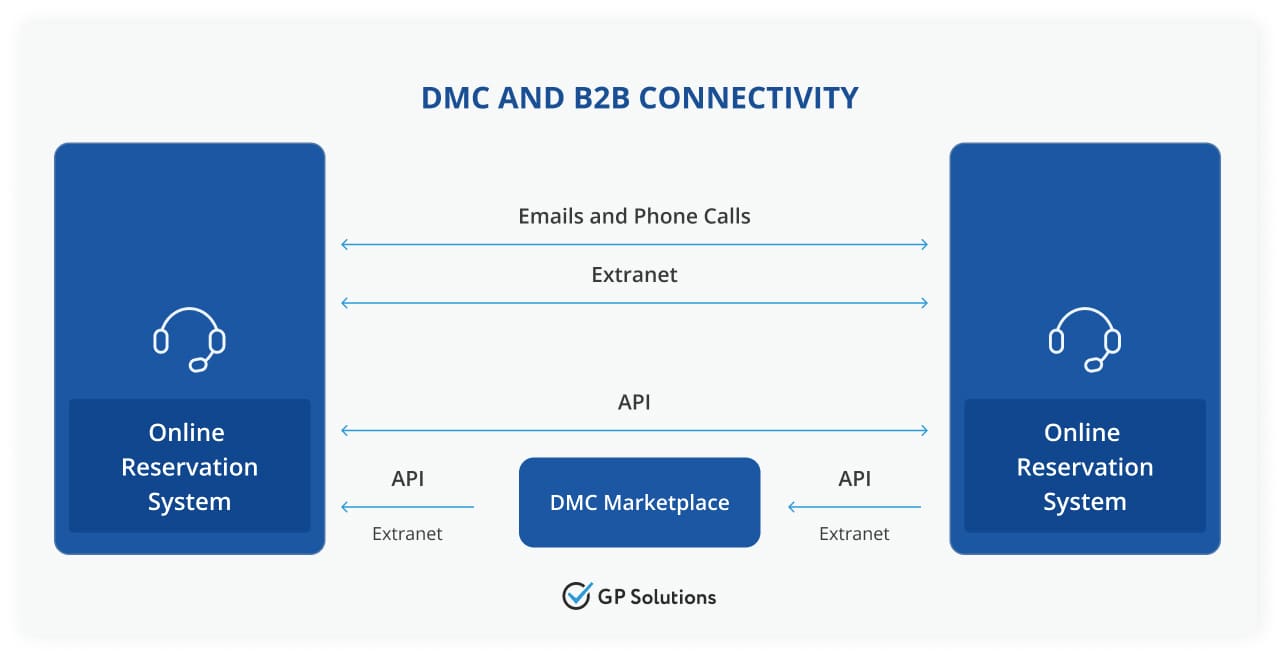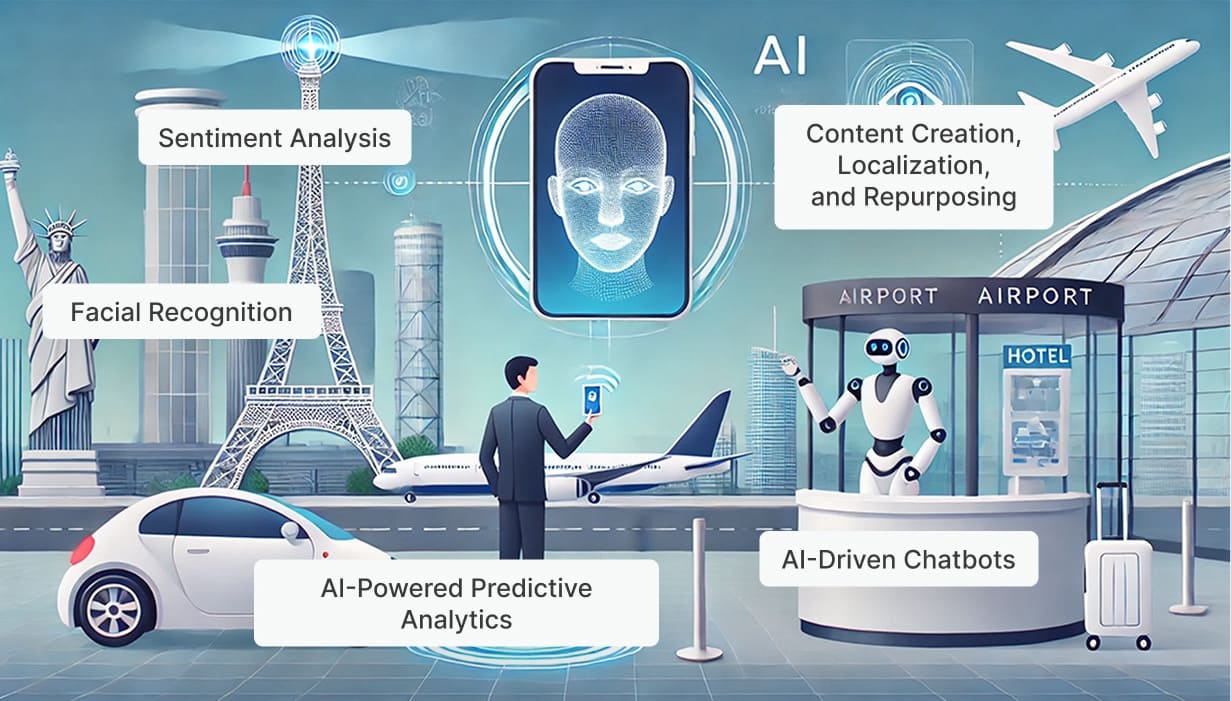- en
- de
Meet Us at Connect Spring Marketplace!
Meet Us at Connect Spring Marketplace!

In 2024, the travel industry witnessed the recovery to the pre-pandemic levels. According to UN Tourism’s data, roughly 1.4 billion tourists traveled around the globe, which is 99% of the 2019 figure. Also, we travelled 11% more compared to the international arrivals in 2023. The recovery is uneven across regions, though the overall trend is definitely on the rise.
International Tourist Arrivals in 2024
Arrivals in 2024
Compared to 2019
Compared to 2023
95 million
+32%
+1%
74 million
+7%
+12%
747 million
+1%
+5%
213 million
–3%
+7%
316 million
–13%
+33%
Source: UN Tourism.
The same source projects that in 2025 we are bound to see a 3% to 5% increase in these numbers, which will be bolstered by the continued recovery in Asia and the Pacific against solid growth elsewhere around the planet.
This trend will bring about new challenges for destination management companies (DMCs), ‘ground handlers’ of tourism activities. They will have to address the consequences of pent-up demand for travel to traditional tourist magnets such as Paris or Venice, the growth of visitor flows to off-the-beaten-track, non-trivial destinations, as well as the rising expectations among regular travelers for new, tailored experiences. This all will be happening against the backdrop of the ever-evolving technical landscape of the travel industry.
The key to success? The wise adoption of tourism technology, capable of tailoring your operations to your business needs and to the tastes of your end customers. The tourism landscape becomes increasingly competitive as we speak, and the use of performant and innovation-friendly destination management system software is unavoidable for DMCs.
In this article, we are going to tap into the transformative role of DMCs for the industry, what is expected from a tourism destination management system, and how other travel businesses can connect to such software.
There are several approaches to the definition of a destination management system (DMS). In a broader sense, it may be treated as a network of coordinated management of all the elements that make up a tourism destination and include all the stakeholders contributing to a destination’s development — tourism boards, destination management organizations (DMO), service providers, government agencies, and, of course, destination management companies (DMCs).

That said, there is another approach to treating a destination management system in tourism — from a tourism technology perspective, where a DMS is an integrated digital platform tailored primarily for destination management companies. It consolidates essential functions such as itinerary planning, bookings, resource allocation, stakeholder communication, and data analytics into one system with the ultimate goal — to effectively manage sophisticated services rendered to inbound tourists. This definition serves best the purpose of our further exploration, since we are going to shift our focus towards more technical issues.
To better understand how a DMS functions, we need to take a quick look at the nature of DMCs and their purpose.

Are you a DMC looking to upgrade your software and your business with it?
We treat DMCs as intermediaries between local suppliers and travel agencies, taking care of the arrangement and overseeing the quality of accommodations, transfers, tours, activities, and other travel-related services in a specific destination.

The DMC typology is quite versatile, as there are DMCs that are involved in one travel service, like Cityride with their transfers or Book Island Tours that operate Antigua, Barbados, and St. Lucia tours. But more often they offer a range of destination services to meet the needs of individuals, groups, and corporate clients.

Due to the nature of their business, a DMC’s operations impact any party involved in the pre-travel and post-travel arrangements as well as traveler experience as such.
Local Expertise and Connections
DMCs have accumulated in-depth knowledge of local attractions, customs, and logistics, which endows them with the ability to offer up extraordinary experiences you would have a hard time arranging via online booking platforms.
Seamless Coordination
While managing multiple aspects of travel, you’ll have too much to comb through — from accommodation to activities — and you’ll agree that it is overly complicated and requires resilience planning. DMCs act as a single point of contact for such cases, facilitating a smooth and hassle-free experience for travelers.
Customized and Immersive Experiences
Amid the rise of the demand for cultural and authentic travel experiences, DMCs are able to provide arrangements such as home stays with locals, traditional culinary workshops, and historical village tours. Such services spark an immersive connection to the destination among travelers.
Emergency Support and Crisis Management
Destination management companies can implement contingency plans to cover unexpected situations such as medical crises, natural disasters, or political unrest. The presence of their staff at the site enables fast adaptation after emergencies, so they can offer needed assistance to travelers asap.
Cost Savings and Preferential Rates
DMCs use their contracts with local suppliers to obtain competitive rates, which enables travel agencies to deliver advantageous packages to their customers. Their knowledge of local prices enables DMCs to prevent clients from spending extra money in vain.
Quality Assurance
Through their established network of providers, DMCs deliver reliable, high-standard services to their clients. They offer quality verification via thorough examinations to maintain reliable service standards and compete with direct online bookings, which may lack such procedures.
We can imagine how complex DMC software must be to handle all the aspects required for unforgettable travel experiences. There are many software solutions designed for the needs of DMCs, like GP Travel Enterprise, demonstrating versatile functionality and the ability to be your ‘one-shop-stop’. However multilevel, any DMC system must have obligatory modules indispensable for managing destination tours.

With a thorough itinerary management module, DMCs create and control multifaceted travel plans that comprise lodging options, transportation services, recreational activities, meal choices, and every other aspect needed to devise memorable all-in-one travel packages. The advanced functionality of destination management software should address automatic updates and provide real-time availability features for handling varied traveling groups (FITs, groups) together with multiple product categories (regular tours, packages, special interest tours, and more).
DMCs harness the power of local connections to negotiate exclusive rates with hotels, transport providers (airlines, transfers, railway, car hires, cruises), and activity vendors. A flawless inventory management system allows them to handle rates, suppliers, special offers, and extras, regardless of whether a DMC operates its own tours and activities or contracts them from local suppliers. Your software should support fast data entry, retrieval, and easy distribution to internal teams and external partners. Also, the issue of flexible prices should be handled within the system, enabling you to promote special offers and discounts and configure pricing.
The extranet functionality provides travel product suppliers with the ability to manage and sell contracted products via system access. Partners/suppliers such as accommodation owners, transfer companies, or charter operators can manually input and modify product description, pricing, and availability. It’s best when you choose DMC software that supports online booking confirmations.
Having such a module will be a heavy plus for your DMC software of choice, since smooth operations during post-booking management are half the success. Normally, with such functionality a DMC can manage local resources such as guides, vehicles, and suppliers to facilitate resource allocation, scheduling, and utilization tracking.
A built-in CRM module enables DMCs to connect with their host of suppliers and customers, track lead generation, and nail down conversion from prospect to final sale. Such a system bolsters engagement through contact management, automated follow-ups, and reports while increasing sales efficiency because all operations stay within a single system.
A Tried and Tested Solution Already Exists!
GP Travel Enterprise is our own product developed with due consideration of all the business aspects DMCs have to settle. Explore its extensive array of modules and capabilities and see if it’s exactly what you’re looking for. Our team will be glad to schedule a demo and show what our travel platform is capable of.

An integrated module for financial management aids in invoicing, payment tracking, and expense management. A DMC destination management system should cover multiple currencies, automated, and multiple payment gateway interfaces while meeting tax regulations.
Customizable data analysis tools allow DMCs to track KPIs, conduct market analysis and understand market trends, and refine their marketing strategies accordingly. Such reports provide insights into sales performance and customer preferences, which is indispensable for data-driven decision-making.
The feature equally appreciated both by DMCs and their customers from B2C and B2B segments. The mobile channel is something you cannot miss these days if you want to see repeat business and, what’s even more important, lure younger audience from the Gen Z segment who like to do everything online.
These two cannot be categorized as ‘features’ but they are aspects of DMC software one can greatly benefit from if you find it among a wide array of destination management system solutions.
A DMC system should be flexible in its nature with the possibility to fine-tune it to a particular DMC’s processes and requirements. You wouldn’t argue that the one-size-fits-all destination management software could work for anyone. Just remember how versatile DMCs, their location, and their services can be.
Key customization options can include:
Let us imagine the situation where a small-scale DMC operating tours to a remote retreat island has exceeded the scope of its initial expectations, managed to establish a strong market presence, developed its brand name, accumulated substantial revenue, and now wants to extend its operations to the neighboring islands. The perfect situation would be if the originally chosen DMC system could evolve alongside with the evolution of this DMC’s business needs, without major system overhauls.
It enables:
Since customization and scalability often go hand in hand, investing in flexible software solidifies long-term adaptability.
A destination management system example that comprises the discussed functionality can be GP Travel Enterprise, whose main category of clients is exactly DMCs with the need to devise complex itineraries and manage business operations at scale.
Now that we know how complex a destination management system might be, we face an even more complex question — how to connect to exotic destinations and hand-crafted local activities to start selling them globally?
As a matter of fact, DMCs can offer their services directly to end customers (i.e., travelers), yet a significant portion of their business comes from partnerships with travel agencies and tour operators.

While many DMCs lack technological capabilities, some offer XML/API connectivity for direct integration between a DMC and a B2B partner who wants to book from it using its own system. It allows real-time access to a DMC’s inventory (hotels, activities, transfers, and other destination services), booking data, and reservation statuses, while its partners (travel agencies, tour operators, and online travel businesses) stay within their own interfaces.
This way of achieving automation comes with an array of benefits such as optimized booking processes, improved data accuracy, access to up-to-date pricing and availability, reduced manual effort, fewer errors, and many more. In the end, it solidifies the chances to grow revenue and expand market reach for any business involved.
A typical DMC API follows RESTful or SOAP architecture to ensure smooth data exchange between travel agencies and DMCs. A REST API communicates via HTTP methods (GET, POST, PUT, DELETE) and returns data in JSON format, while SOAP APIs use XML messaging for structured data transfer.
Normally, the technical aspects of such integration include:
One of the most common ways agencies interact with DMCs is the connection to online reservation systems (ORS) via travel agent extranet. These systems provide a streamlined way for travel agents to register, access, and book a DMC’s portfolio of travel products. Agents typically register via an online form, after which an Account Manager facilitates onboarding. Once approved, agents receive login credentials to access the DMC’s travel system.
Examples of ORS in Action:
Marketplaces serve as intermediaries, aggregating DMC inventory and connecting them with travel agents.
Need more information about connection options for your DMC?
Reach out to us, and we’ll analyze your situation, infrastructure, and suggest an action plan based on our success stories.
The tourism sector could not (and must not) escape the victorious march of AI, which has marked a substantial shift in how destinations are going to manage their business. Let’s take a look at tangible examples of its practical applications.

The advancement of digitalization in travel is inevitable. In fact, provided you have a stable and secure internet connection, it is your best and most effective way to establish a strong market presence in the evolving landscape of doing business. Luckily, DMCs have plenty of options to choose from for any budget. Enhance your operations with automation, integrate data analytics, manage your inventory and CRM, and connect to the rest of the world — and you are on the right track towards capitalizing on modern technologies.
As tourism rebounds post-pandemic, destinations must prioritize well-managed tourism to remain attractive and sustainable. And the right technology makes it way easier.
Leave your request
We will contact you shortly
Thank you for your request!
We will get back to you as quickly as possible
Get latest insights
from our travel tech experts!
Join 200+ travel fellows! Get GP Solutions' latest articles straight to your inbox. Enter your email address below:
Thank You!